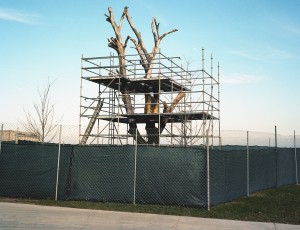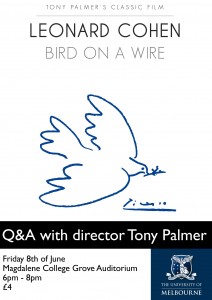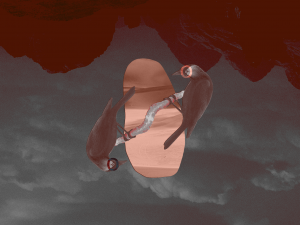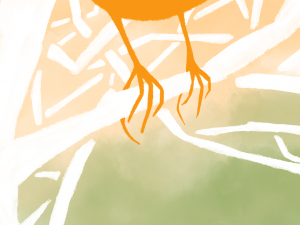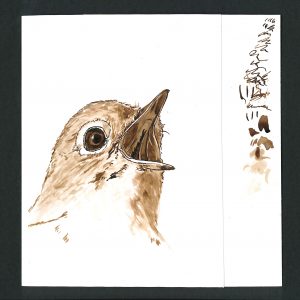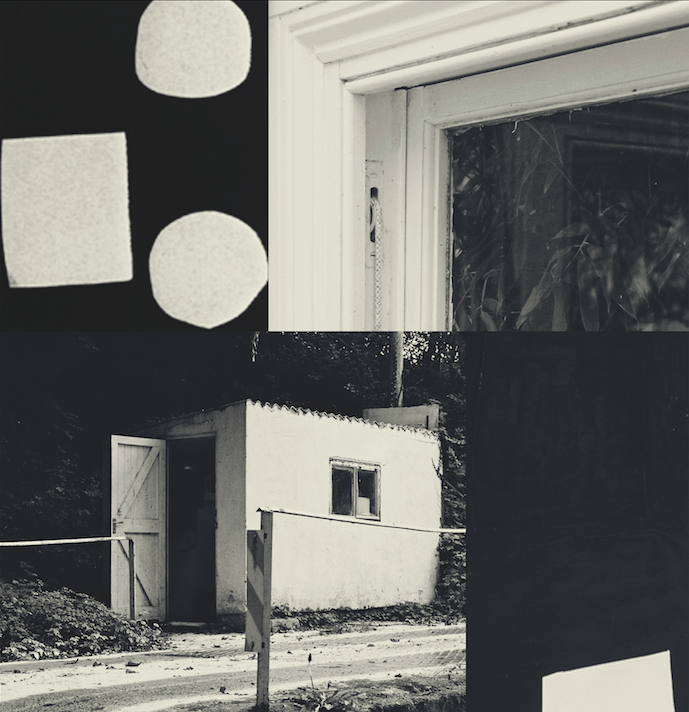
The Freedom Bird: Storytelling at Campsfield detention centre
by Francis Martin | March 7, 2015
A hunter was walking in the woods when he saw a bird with feathers of gleaming gold. It began to sing, but instead of a beautiful tune it squawked: “nah nah na nah-naahh”. The huntsman was irritated that such a beautiful bird had such an ugly song, and he threatened to shoot if it were to repeat the mocking call. The bird opened its beak: “nah nah na nah-naahh”.
Campsfield House in Oxfordshire detains over 200 men who are waiting for a decision on their legal status in the United Kingdom and facing the possibility of deportation. Half a dozen of these men and two professional storytellers are sitting in a circle in a small room off the main yard. They have come to hear traditional stories from around the world, one of several activities available to punctuate the tedium of detention. There is a man from the Punjab who is around 60 years old, but the other men are all in their late twenties or early thirties. The storyteller on his feet is a small man with a white pointed beard, a maharaja moustache and a topi on his head. His face is lively, his eyes playful and voice energetic.
The huntsman raised his bow and loosed an arrow – but missed. “Nah nah na nah-naahh” the golden bird replied. The hunter gritted his teeth in anger and loosed another arrow. The bird was struck in the chest, and fell to the ground. The hunter dropped it into his bag, slung it over his shoulder and started for home. He had only gone a hundred paces when he heard a noise from the bag: “nah nah na nah-naahh”.
We all crow along with the bird’s ugly song. The man from the Punjab doesn’t speak English, but he joins in with the two-tone nasal whine. The storytellers have brought a drum and he holds it throughout the story. He plays it at apposite moments: when we sing the bird’s song, when the hunter releases an arrow or when his target falls to the ground. He can’t follow the details of the story, though at various points the storyteller stops and asks for translations of important words such as “hunter” or “golden bird”. Music and this minimal translation are enough to hold the group together.
The hunter was furious, and hurried home. He put the bird down on a block of wood, took up a meat cleaver and cut it into a hundred pieces. Then he threw the pieces into a pot of water and placed it over the fire. He was just sitting back, pleased with himself, when a noise came from inside the pot, distorted by the water but unmistakable: “nah nah na nah-naahh”.
At an earlier session I watched a Brazilian man sing a lullaby accompanied by a drummer from Bangladesh. They spoke no common language, and would never come together outside of the storytelling sessions, as the social groups in the centre are defined by nationality and language. Through stories and song, the two men were able to share something aside from the fact that they were both incarcerated for an indefinite period in Oxfordshire.
The hunter dug a deep hole and threw the contents of the pot into it before piling the earth back and stamping it down. Very faintly, he heard the cry: “nah nah na nah-naahh”. Incensed, he dug the ground up again, took the hundred pieces and placed them in a box bound with strong rope and weighed-down with rocks. He took the box to a river, and threw it into the deepest part. It sank, and there was silence.
An Iraqi man has heard the story before. When he was a child, during the First Gulf War in 1990–91, his uncle had told him a story every evening. The stories offered some escape from the bloody strife of everyday life in Iraq, allowing him to live for a little while in worlds populated by heroes and villains, the former rewarded with happily-ever-afters whilst the wicked never prospered. He says he doesn’t often think about those stories his uncle told over twenty years ago, but is glad to be reminded of them now.
Three days later, some children were playing on the banks of the river. They spotted the box bobbing on the surface, ropes and rocks washed away by the flow of the water. They hauled it to the bank and prised it open. In an explosion of golden feathers, one hundred birds burst from the box. The huntsman, who happened to be nearby, saw the gilded flock rise into the air. “Ah,” he said to himself, “I now know who you are. You are the Freedom Bird, for you cannot be suppressed.”
We discuss the story in small groups. Each of the six men agrees that freedom is more important than comfort and security. Immigration detainees are given a bed and food is provided, and at 11 o’clock they are locked in their cells and the lights are turned off. For an hour and a half on a Wednesday afternoon, stories offer a brief respite from this routine. The project is three years old, but its funding has not been renewed and this is one of the last sessions. When four o’clock comes, a guard – who has been sitting by the door throughout the session – motions to escort us out, back down the long corridors and through the heavy gates, the security scanner, the fences crowned with razor wire. As we leave, we say goodbye to the detainees as though for the last time: by next week they might have been released back into British society, or have been deposited in a different continent. Or we might find them when we return, smoking a cigarette in the yard, eager to hear more stories.
Image: Linus Bill + George McGoldrick
